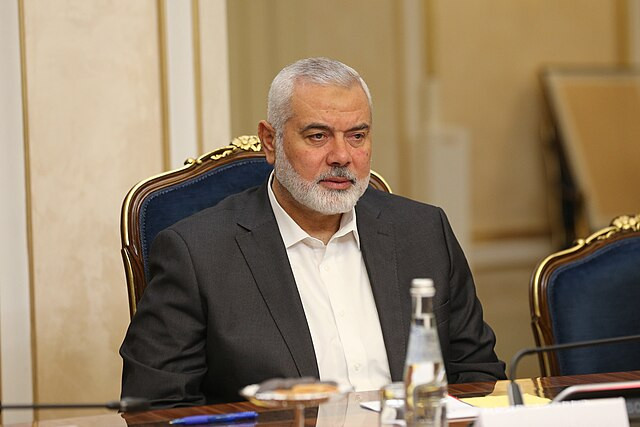In a scene of heightened tension and fervent vows of retaliation, Ismail Haniyeh, a prominent Hamas leader, was buried in Qatar on Friday following his assassination in Tehran. This event has intensified the already volatile conflict between Hamas and Israel, which has been raging for nearly eleven months.
Haniyeh's funeral took place in Lusail, where mourners, including high-profile figures like Khaled Meshaal, who is expected to succeed Haniyeh, and Qatar's Emir Sheikh Tamim bin Hamad al-Thani, gathered to pay their respects. The coffin, draped in the Palestinian flag, was carried in a solemn procession alongside the casket of his bodyguard, who was also killed in the attack.
The assassination of Haniyeh, which occurred in a state guesthouse in Tehran, has been attributed by Hamas and Iran to Israeli forces, although Israel has neither confirmed nor denied involvement. The incident marks a significant escalation in the ongoing conflict that spans from Gaza to the Red Sea and the Lebanon-Israel border.
"Our message to the occupation (Israel) today is that you are sinking deep in the mud and your end is getting closer than ever. The blood of Haniyeh will change all equations," declared senior Hamas official Sami Abu Zuhri, reflecting the militant group's resolve to intensify its fight.
The violent death of Haniyeh, killed by a missile strike, is one in a series of targeted killings of Hamas and Hezbollah leaders. These actions have fueled fears of the conflict spreading further across the Middle East. In the United States, President Joe Biden remarked that Haniyeh's assassination complicates international efforts to secure a ceasefire in Gaza. "It doesn't help," Biden told reporters.
Qatar, alongside Egypt and the United States, has been at the forefront of peace efforts. Haniyeh's death, however, has sparked a wave of grief and calls for vengeance among his supporters. "Today we came...to affirm that the resistance will not end with the martyrdom of the leader, and behind the leader comes a new leader," said mourner Khaled Suleiman.
Haniyeh was a key figure in Hamas' international diplomacy, navigating between Turkey and Doha to evade travel restrictions imposed by the blockade of Gaza. Appointed as the top leader of Hamas in 2017, he was perceived as a pragmatist compared to more hardline elements within the group, although his stance was still firmly anti-Israel.
The recent assassinations have also seen the elimination of other key figures such as Mohammed Deif, the commander of Hamas' military wing, and Fuad Shukr, a senior Hezbollah commander. These targeted strikes have left Yahya Sinwar, a notorious figure within Hamas, as the de facto leader. Sinwar, who has been instrumental in orchestrating attacks against Israel, remains a high-priority target for Israeli forces.
Stephen Ganyard, a retired Marine colonel and ABC News contributor, noted, "The real guy that the Israelis want to get and will likely eventually get is Sinwar. He's in a tunnel likely somewhere in Gaza, still running the show within Gaza."
Sinwar's emergence as the leader comes at a critical juncture. He is one of the architects behind the surprise attack on Israel on October 7, which resulted in significant casualties and hostages. Israel has placed a $400,000 bounty on Sinwar, highlighting his strategic importance.
The geopolitical landscape has been further complicated by the reaction from Iran. Iranian Supreme Leader Ayatollah Ali Khamenei has called for revenge, exacerbating tensions and making ceasefire negotiations more precarious. "Who's going to eventually call the shots is Sinwar. He's the guy that's going to have to agree to any kind of peace negotiation with the Israelis," Ganyard added.
Sinwar, a veteran of Hamas who was imprisoned by Israel for over two decades, is known for his ruthless tactics and unwavering commitment to the group's cause. His leadership is likely to steer Hamas towards a more aggressive stance against Israel, complicating peace efforts.




